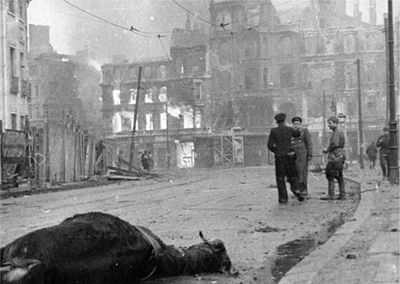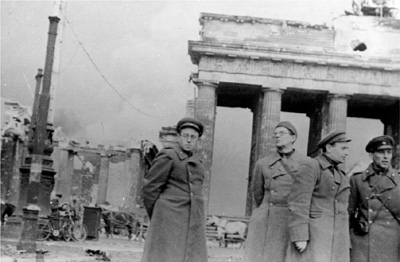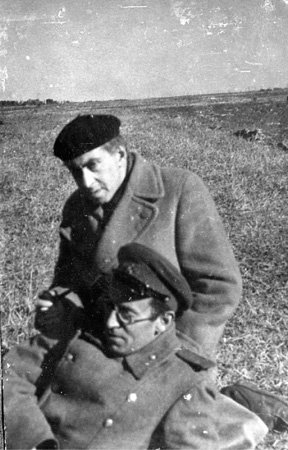A Writer at War (57 page)
Authors: Vasily Grossman

Foreigners. [Forced labourers and prisoners of war.] Their suffering, their travelling, shouting, threats towards German soldiers. Top hats, whiskers. A young Frenchman said to me: ‘Monsieur, I love your army and that’s why it is painful for me to see its attitude to girls and women. This is going to be very harmful for your propaganda.’

Grossman in a Berlin street on 2 May 1945, the day of the surrender.
Looting: barrels, piles of fabric, boots, leather, wine, champagne, dresses – all this is being carried on carts and vehicles, or on shoulders.
Germans: some of them are exceptionally communicative and amiable, others turn away sullenly. There are many young women crying. Apparently, they have been made to suffer by our soldiers.
It was in Germany, particularly here in Berlin
, that our soldiers really started to ask themselves why did the Germans attack us so suddenly? Why did the Germans need this terrible and unfair war? Millions of our men have now seen the rich farms in East Prussia, the highly organised agriculture, the concrete sheds for livestock, spacious rooms, carpets, wardrobes full of clothes.
Millions of our soldiers have seen the well-built roads running from one village to another and German autobahns . . . Our soldiers have seen the two-storey suburban houses with electricity, gas, bathrooms and beautifully tended gardens. Our people have seen the villas of the rich bourgeoisie in Berlin, the unbelievable luxury of castles, estates and mansions. And thousands of soldiers repeat these
angry questions when they look around them in Germany: ‘But why did they come to us? What did they want?’
Most soldiers flocked to the Reichstag on this day of victory. Only a few, mainly officers, appear to have found the Reichschancellery. They were allowed to wander around on the ground floor, but SMERSh operatives, under the command of General Vadis, had sealed the cellars and the bunker. They were searching desperately for Hitler’s body. Grossman, who went with Efim Gekhman, collected souvenirs and Nazi memorabilia. According to Ortenberg, Grossman obtained the last souvenirs in his collection on 2 May 1945 in Berlin. Grossman and Gekhman entered Hitler’s office in the morning. Grossman opened a drawer of a desk, inside were stamps saying ‘The Führer has confirmed’, ‘The Führer has agreed’, etc. He took several of these stamps, and they are now in the same archive as his papers.
The new Reichschancellery. It’s a monstrous crash of the regime, ideology, plans, everything, everything. Hitler
kaputt
. . .
Hitler’s office. The reception hall. A huge foyer, in which a young Kazakh, with dark skin and broad cheekbones, is learning to ride a bicycle, falling off it now and then. Hitler’s armchair and table.

Grossman at the Brandenburg Gate.
A huge metal globe, crushed and crumpled, plaster, planks of wood, carpets. Everything is mixed up. It’s chaos. Souvenirs, books with dedicatory inscriptions to the Führer, stamps, etc.
In the south-west corner of the Tiergarten, Grossman also visited Berlin’s zoo.
Hungry tigers and lions . . . were trying to hunt sparrows and mice that scurried in their cages.
The Zoological Garden. There was fighting here. Broken cages. Corpses of marmosets, tropical birds, bears, the island for hamadryases, their babies are holding on to their mothers’ bellies with their tiny hands.
Conversation with an old man. He’s been looking after the monkeys for thirty-seven years. There was the corpse of a dead gorrilla in a cage.
‘Was she a fierce animal?’ I asked.
‘No. She only roared a good deal. People are angrier,’ he replied.
On a bench, a wounded German soldier is hugging a girl, a nurse. They see no one. When I pass them again an hour later, they are still sitting in the same position. The world does not exist for them, they are happy.
Grossman returned to Moscow and in early June escaped to a dacha. At first he could not write. He collapsed with nervous exhaustion, a reaction which had been postponed, like for so many who returned from the war. But then, with rest, fresh air, fishing and long walks, he felt ready to start his self-imposed task – to honour in his writing the heroism of the Red Army and the memory of the countless victims of the Nazi invasion.
1
Starostas
, the village elders or mayors, appointed by the Germans, rightly feared the retribution of the NKVD and had fled to Germany in front of the advancing Red Army.
2
This rumour was wrong. General Vlasov and the bulk of his troops were in Czechoslovakia, where at the last minute they sided with the Czech uprising in Prague against the Germans, but this did nothing to temper their fate at the hands of a vengeful NKVD. Vlasov was captured by a Soviet tank unit and flown back to Moscow, where he is said to have been tortured to death.
3
Colonel-General Nikolai Erastovich Berzarin (1904–1945)
4
The Tresckows (with a ‘c’) were an old Prussian family, of whom the best-known member was Major-General Henning von Tresckow (1901–1944), who smuggled a bomb aboard Hitler’s plane on 13 March 1943, but it failed to go off. Tresckow committed suicide with a grenade on 21 July 1944. The Schloß Treskow in which Grossman was billeted was most probably Schloß Friedrichsfelde on the east side of Berlin, which belonged to the illegitimate, and much richer, branch of the family, spelt without a ‘c’. They had made their money by selling cavalry mounts all over Europe. Münthe von Treskow, whose book Grossman examined, was thrown out of his house by Soviet troops and is said by the family to have died of starvation.
5
This is the IX Rifle Corps commanded by Lieutenant General I.P. Rosly, which was part of the 5th Shock Army, commanded by Colonel-General Berzarin.
6
General Helmuth Weidling, the commander of LVI Panzer Corps, had been appointed commander of Berlin on 23 April by Hitler just after the Führer, due to a misunderstanding, had ordered his arrest for cowardice. Weidling, after his surrender at General Chuikov’s headquarters, prepared this announcement to encourage his men to lay down their arms and halt the bloodshed.
The Lies of Victory
Vasily Grossman’s belief in a ‘ruthless truth of war’ was cruelly scorned by the Soviet authorities, especially when they attempted to suppress information about the Holocaust. At first, he refused to believe that anti-Semitism could exist within the Soviet system. He had assumed that the jibes of Sholokhov which had outraged both Ehrenburg and him were an isolated example of reactionary sentiments, leftovers from the pre-revolutionary past. But he was to find soon after the war that the Stalinist system itself could be deeply anti-Semitic. Much later, when writing
Life and Fate
, he made it appear to be overt during the war, but this was premature. There were warnings, but the anti-Semitism within the regime did not emerge fully until 1948. It then became virulent in 1952, with Stalin’s ‘anti-cosmopolitan’ campaign and the conspiracy theory that Jewish doctors were attempting to kill Soviet leaders. Yet Stalin’s anti-Semitism was not quite the same as that of the Nazis. It was based more on xenophobic suspicion than on race hatred.
The Jewish Anti-Fascist Committee, formed in April 1942 following the appeal the year before to ‘brother Jews’ throughout the world to aid the struggle, was bound to be an object of distrust to Stalin. The slightest hint of contact with foreigners had been enough to condemn countless victims of the Great Terror in 1937 and 1938. Only during the early months of the war, when the country was faced with a mortal threat, could Stalin contemplate the idea of Jews in the Soviet Union making direct contact with American and British Jews. But the suggestion that a sort of International Brigade of foreign, especially American, Jews could be recruited to fight as a separate unit within the Red Army was firmly vetoed. It is perhaps significant that almost immediately after Moscow was saved in December 1941, two of the original proponents of the scheme, the Polish Jews Henryk Erlich and Viktor Alter, were arrested. Erlich later committed suicide in prison and Alter was executed.
The Soviet authorities tolerated the Jewish Anti-Fascist Committee as a propaganda front at a time when American Lend-Lease aid was so vital
to the country’s survival. But the committee’s energy and determination to expand its remit to cover the Holocaust was bound to put it on a collision course with Stalinist policy. The fact that the idea had partly originated in the United States with Albert Einstein and prominent American Jews later made
The Black Book
even more unacceptable to the Stalinist mind, even though the Soviet Information Bureau had given its consent to the project in the summer of 1943. Grossman, the Russian patriot, and the Francophile Ehrenburg were both assimilated Jews who had never cared for Orthodox ritual. They now identified with the fate of all the Jews of Europe. Also during the summer of 1943, once the tide of war had turned decisively against the Nazis, both Ehrenburg and Grossman found that major publications rejected most of their articles on the subject. Only small Jewish journals could be counted on to accept them, so they concentrated their efforts on the project of
The Black Book
, involving over twenty writers in the Soviet Union alone.
1
Later, Grossman pointedly asked Konstantin Simonov to contribute a section on Majdanek, but he excused himself on the grounds that he was too busy. Simonov was evidently not prepared to risk antagonising the authorities.
It was towards the end of 1944 that Ehrenburg quarrelled with the other members of the JAC’s literary committee and Grossman took over editorial responsibility. But in February 1945, the Sovinformburo criticised the emphasis on the activity of traitors in the occupied territory collaborating with the German annihilation of the Jews. It was a point on which Grossman had passionately disagreed with the far cannier Ehrenburg. For the authorities, the only useful purpose of
The Black Book
was as testimony for the prosecution case against fascist Germany.
After the war, the JAC found it impossible to obtain a decision on
The Black Book
from the authorities. In November 1946, Ehrenburg, Grossman and Solomon Mikhoels, the chairman of the JAC, addressed a petition to Andrei Zhdanov, the secretary of the Central Committee.
2

With Ilya Ehrenburg, during the war
Again there was no reply. Finally, eleven months later, in October 1947, the committee was informed that the book contained ‘
grave political errors
’ and was banned. The Cold War had begun in earnest that September, and the Jewish Anti-Fascist Committee became even more suspect after its contacts with the United States. It was closed down two months later. The type of
The Black Book
was broken up. In January 1948, Solomon Mikhoels was crushed to death by a truck in Minsk. This later proved to be a KGB operation to eliminate him. Grossman, who had accompanied Mikhoels to the station on this fatal excursion, may have suspected something when he received the shocking news, but the method of assassination used was almost too crude to be believable.
In 1945 and 1946, Grossman’s career had continued to prosper, despite his work on
The Black Book
. Some of his
Krasnaya Zvezda
articles were
reprinted in a small volume called
Gody Voiny
, or
The Years of War
, which was then circulated in several foreign translations. A new edition of
The People Immortal
was issued and even adapted as a play. But this success did not last much longer than a year. In August 1946, a period of ideological and cultural repression was launched by Andrei Zhdanov, which was to be dubbed the
zhdanovschina
, an echo of the great terror known as the
yezhovschina
. Even without his work on
The Black Book
, a writer as honest as Grossman was bound to face a difficult time in this post-war ‘lesser terror’. In September, his play
If We are to Believe the Pythagoreans
was viciously attacked in
Pravda
. Then an oblique attack was made on his wartime writing, but the main target of official displeasure remained
The Black Book
.
